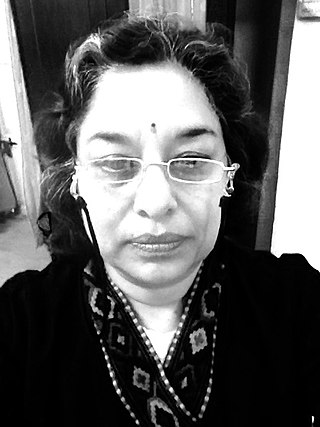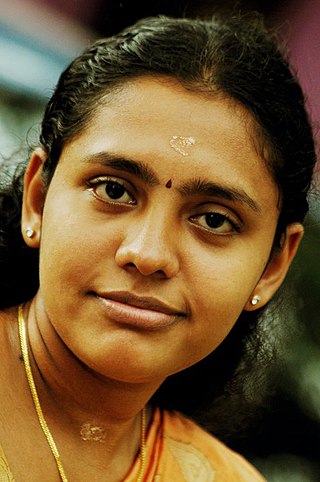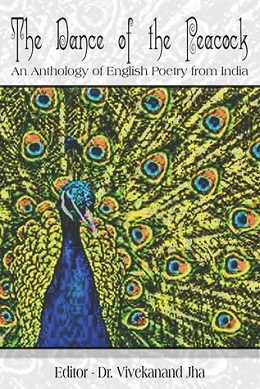Indian poetry and Indian literature in general, has a long history dating back to Vedic times. They were written in various Indian languages such as Vedic Sanskrit, Classical Sanskrit, Ancient Meitei, Modern Meitei, Telugu, Tamil, Odia, Maithili, Kannada, Bengali, Assamese, Hindi, Marathi and Urdu among other prominent languages. Poetry in foreign languages such as English also has a strong influence on Indian poetry. The poetry reflects diverse spiritual traditions within India. In particular, many Indian poets have been inspired by mystical experiences. Poetry is the oldest form of literature and has a rich written and oral tradition.

Jayanta Mahapatra was an Indian poet. He is the first Indian poet to win a Sahitya Akademi award for English poetry. He was the author of poems such as "Indian Summer" and "Hunger", which are regarded as classics in modern Indian English literature. He was awarded a Padma Shri, the fourth highest civilian honour in India in 2009, but he returned the award in 2015 to protest against rising intolerance in India.
Indian English literature (IEL), also referred to as Indian Writing in English (IWE), is the body of work by writers in India who write in the English language but whose native or co-native language could be one of the numerous languages of India. Its early history began with the works of Henry Louis Vivian Derozio and Michael Madhusudan Dutt followed by Rabindranath Tagore and Sri Aurobindo. R. K. Narayan, Mulk Raj Anand and Raja Rao contributed to the growth and popularity of Indian English fiction in the 1930s. It is also associated, in some cases, with the works of members of the Indian diaspora who subsequently compose works in English.

K. Ayyappa Paniker, sometimes spelt Ayyappa Panicker, was a Malayalam poet, literary critic, and an academic and a scholar in modern and post-modern literary theories as well as ancient Indian aesthetics and literary traditions. He was one of the pioneers of modernism in Malayalam poetry, where his seminal works like Kurukshethram (1960), is considered a turning point in Malayalam poetry. Many of Ayyappa Paniker's poems and his several essays were an important influence on later generations of Malayalam writers. His poems often reflected his deep concern for the environment with works such as Kadevide Makkale -Malayalam കാടെവിടെ മക്കളെ
Indian English poetry is the oldest form of Indian English literature. Henry Louis Vivian Derozio is considered the first poet in the lineage of Indian English poetry followed by Rabindranath Tagore, Sri Aurobindo, Sarojini Naidu, Michael Madhusudan Dutt, and Toru Dutt, among others.

Gopikrishnan Kottoor is the pen name of Raghav G. Nair, an Indian English poet. He is best known for his poem "Father, Wake Us In Passing". He is also the founder editor of quarterly poetry journal Poetry Chain. Kottoor lives in Trivandrum, Kerala.

Samartha Vashishtha is an Indian poet writing in English and Hindi, his mothertongue. He has published three volumes of poems; two in English — Anhadnad, a collection of his childhood poems in the year 2000 and Shadows Don't Live in Walls in 2004 — and a book of poems in Hindi titled Sapne Mein Piya Pani. He won a Poetry Chain-Poetry Society (India) Annual Poetry Prize in 2003 for his poem-sequence, Simla.

Sitakant Mahapatra is an Indian poet and literary critic in Odia as well as English. He served in the Indian Administrative Service (IAS) from 1961 until he retired in 1995, and has held ex officio posts such as the Chairman of National Book Trust, New Delhi since then.
Shiv K. Kumar was an Indian English-language poet, playwright, novelist, and short story writer. His grandfather late Tulsi Das Kumar was a school teacher and his father Bishan Das Kumar, was a retired headmaster. The letter 'K' stands for Krishna, i.e. Shiv Krishna Kumar.
Rajagopal Parthasarathy is an Indian poet, translator, critic, and editor.

Smita Agarwal is an Indian poet and a professor of English literature at the University of Allahabad, India.
The Poetry Society (India) was formed in July 1984 at New Delhi as a voluntary association to promote Indian poetry and to look after the interests of Indian Poets. The founding members included the Indian poets Keshav Malik, J P Das, H K Kaul and Lakshmi Kannan. The Society conducts seminars, creative writing workshops, reading and publication of poetry journal and anthologies. It also conducts All India Poetry Competitions, including competitions among school children.
"Madras Central" is an English poem and the best known work of Vijay Nambisan, the Indian poet, writer and journalist. The poem won First Prize in the inaugural All India Poetry Competition conducted by The Poetry Society (India) in 1988. The poem has received critical acclaim following its first publication in 1989.
"The Coffin Maker" is a poem by the Indian English poet Gopi Krishnan Kottoor. The poem won Second Prize in the Sixth All India Poetry Competition conducted by The Poetry Society (India) in 1995. This was the first major literary award for Kottoor, who went on to win four more major poetry awards at All India Poetry Competition.
"Digging..." is a popular Indian poem by the internationally acclaimed Indian English poet Gopi Krishnan Kottoor. The poem won Second Prize in the Seventh All India Poetry Competition conducted by The Poetry Society (India) in 1997. The renowned British poet Vicki Feaver was the Chairman of the award committee. This was the second major literary award for Kottoor, who went on to win four more major poetry awards at All India Poetry Competition.

Vihang A. Naik or Vihang Ashokbhai Naik is a modern bilingual poet from Gujarat, India. He has authored many collections of poetry in English and Gujarati, besides translating poems from Gujarati into English. He died in the year 2021.

Arya Gopi is a Malayalam poet from India. She has written five books in Malayalam and one in English. She has won numerous awards and honours including Kerala Sahithya Akademi Kanakasree Award, Kerala Government Youth Icon Award, Kerala StateYouth Welfare Board Swami Vivekananda Yuva Pratibha Award, Vyloppilli Award, ONV International Yuva Award, Kakkad Award, VT Kumaran Master Award, etc.

The Dance of the Peacock: An Anthology of English Poetry from India is a 2013 anthology of poems written by one hundred and fifty-one poets; edited by Dr Vivekanand Jha. The one hundred and fifty-one poets include Indians and diasporic Indians.The book was published by Hidden Brook Press, Canada.
All India Poetry Prize was instituted by Poetry Society of India in 1988. The prizes are awarded to the best single work of poetry submitted by an Indian poet. The number of prizes varies from year to year.









